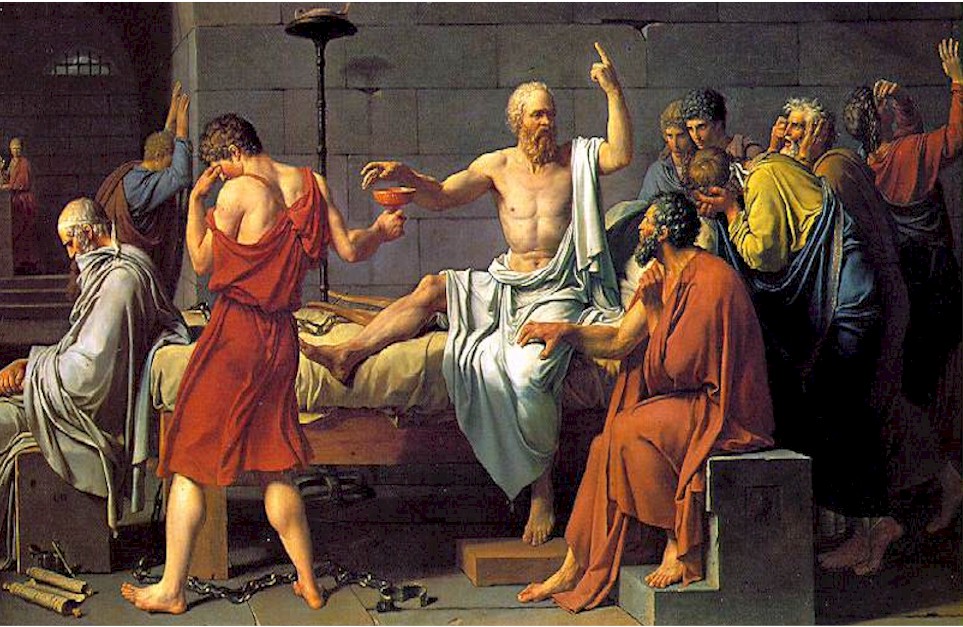Poker is a game that glorifies dishonesty. It is a game where the lie has been raised to an art form. And I do mean art. Anyone who watched Phil Ivey 5-bet bluff Peter Jackson with Queen-high at the Monte Carlo Millions in 2005 has seen a true artist plying his trade (If you haven’t seen this classic hand – take yourself to youtube right now). Genius.
But it is also a game that is unwinnable without honesty. Without frank self-assessment; without a willingness to know the self, a poker player is doomed to failure.

“Know thyself” was the advice of that old Greek, Socrates. It was written above the entrance of the Temple of Delphi. They should put it above the door at that other great temple – the Rio Hotel and Casino, right below the “World Series of Poker” sign.
“Welcome participants in the 41st World Series of Poker: Know thyself”
Those Greeks – they knew how to win at poker before it was even invented. Maybe that’s why there’s always one in every game you play, anywhere in the world.
Poker is a skill (or an occupation) with a balance sheet. Not many other walks of life articulate so clearly whether you are succeeding, failing, or breaking even in your chosen profession. Certainly not in such clear, numerical terms. A plumber doesn’t sit down at the end of the year and say to himself: ‘well, I’m a plus 37 for plumbing this year’. An office manager doesn’t tell herself: “oh shit, the spreadsheet says I’m down 190 this year for office managing, I better get my act together”.
A hedge fund speculator certainly doesn’t correlate skill with remuneration – they may find themselves with a billion dollar loss on their accounts and still drive home (in a Mercedes) to their home (on the upper west side in New York) with their multi-million dollar pay package intact. Fuckers.
But Poker is pure. The numbers are unarguable. Are you a winning poker player? There is no ambiguity here – it’s black or white (or red). The numbers do not lie.
But you can lie to yourself. You can blame your luck, or variance, or the old Greek guy who keeps calling your raises with trash. You can ignore the numbers and announce yourself ‘about even’ on the night, or the month, or the year. Of course you can: the poker rooms are awash with the deluded and the self-deceiving.
But the numbers are always there, waiting; waiting for you to sit down and consider them in all their brutal clarity. It is not easy to consider these losses, as it almost always entails considering yourself at your worst.
I remember stumbling out of the casino after a long, long night of bad beats, bad play, heavy drinking and tilt. I’d gone through at least three buy-ins in a game that (at the time) was probably too high for me to play. Walking out into a cold, deserted carpark at 5am, I took the last chip I had in my pocket – a dirty, faded, one dollar chip – and hurled it at the gods in disgust. Disgusted at my luck, angry at putting myself in a situation where I could lose so much money; furious with the ‘inferior’ players who were now playing with my money.
These moments always burn (and it is moments such as these which, in the end, make poker worth playing – how can we truly appreciate the highs of victory without such despairing lows?) But it is these moments we should turn to our advantage. It is here, at our poker worst, where we need to ask the tough questions. Why did I lose? How could I have changed the outcome? How could I have minimised those loses? Was I just outplayed? Should I step down a level? What are my weaknesses? I always try to write a list of mistakes I’ve made after every session, win or lose.
But urging players to ‘know thyself’ at any tournament or cash game, in any poker room, is an exercise in futility. And lucky for me that it is. For without the dishonest, the perpetually self-deceiving, without those living an unexamined poker life, I would never be able to grind out a meager profit.
This is what it really should say at the WSOP:
“Welcome participants in the 41st World Series of Poker: Everyone wins a bracelet”
Ahh, Dishonesty. It makes the poker world go round.
This article was first published in PokerNews Australia.
